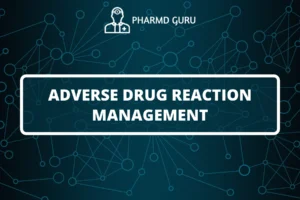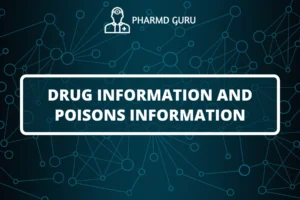Clinical pharmacy plays a vital role in healthcare by optimizing medication therapy and ensuring patient safety. In this article, we will explore the definitions, development, and scope of clinical pharmacy, shedding light on its importance in modern healthcare practices.
SCROLL DOWN TO THE BOTTOM OF THE PAGE FOR ACTUAL NOTES
TABLE OF CONTENTS:
- Introduction: What is Clinical Pharmacy?
- Historical Development of Clinical Pharmacy
- Evolution of Clinical Pharmacy Practice
- The Scope of Clinical Pharmacy
- Role of Clinical Pharmacists in Patient Care
- Collaborative Healthcare Teams
- Benefits of Clinical Pharmacy
- Integration of Technology in Clinical Pharmacy
- Education and Training for Clinical Pharmacists
- Regulatory Guidelines for Clinical Pharmacy
- Challenges and Future Direction
1. Introduction: What is Clinical Pharmacy?
Clinical pharmacy is a specialized field of pharmacy that focuses on direct patient care. It involves the application of pharmaceutical knowledge and skills to optimize medication use, promote patient safety, and improve healthcare outcomes. Clinical pharmacists work as integral members of the healthcare team, collaborating with physicians, nurses, and other healthcare professionals to provide comprehensive pharmaceutical care.
2. Historical Development of Clinical Pharmacy
Clinical pharmacy emerged as a distinct discipline in the mid-20th century in response to the growing complexity of medication regimens and the need for more specialized pharmaceutical expertise. The concept of clinical pharmacy originated in the United States and gradually spread to other parts of the world, shaping the future of pharmacy practice.
3. Evolution of Clinical Pharmacy Practice
Over the years, clinical pharmacy practice has evolved significantly. Initially, clinical pharmacists primarily focused on medication dispensing and compounding. However, with advancements in healthcare, the role of clinical pharmacists expanded to include activities such as medication reconciliation, drug therapy monitoring, patient counseling, and medication management.
4. The Scope of Clinical Pharmacy
The scope of clinical pharmacy encompasses a wide range of responsibilities. Clinical pharmacists are involved in medication therapy management, conducting comprehensive medication reviews, evaluating drug-drug interactions, and recommending appropriate therapeutic interventions. They play a crucial role in promoting rational drug use, preventing adverse drug events, and improving patient adherence to prescribed medications.
5. Role of Clinical Pharmacists in Patient Care
Clinical pharmacists actively participate in patient care by providing evidence-based drug information, monitoring drug therapy, and offering medication counseling. They collaborate with healthcare providers to develop individualized treatment plans, taking into account patients’ medical history, current conditions, and medication-related needs. Clinical pharmacists also contribute to medication reconciliation during care transitions, ensuring seamless continuity of therapy.
6. Collaborative Healthcare Teams
Clinical pharmacists work in close collaboration with other healthcare professionals to deliver comprehensive patient care. They actively participate in interdisciplinary healthcare teams, attending rounds, providing medication-related recommendations, and contributing to the overall treatment decision-making process. This collaborative approach enhances patient outcomes by incorporating diverse perspectives and expertise.
7. Benefits of Clinical Pharmacy
The incorporation of clinical pharmacy services in healthcare systems has demonstrated numerous benefits. These include improved medication safety, reduced healthcare costs, enhanced patient satisfaction, and decreased medication-related adverse events. Clinical pharmacists’ expertise in optimizing drug therapy helps identify and resolve medication-related problems, leading to better patient outcomes.
8. Integration of Technology in Clinical Pharmacy
Technology plays a crucial role in supporting clinical pharmacy practice. Electronic health records (EHRs), computerized physician order entry (CPOE) systems, and clinical decision support tools enable clinical pharmacists to access patient information, identify potential drug interactions, and make informed medication recommendations. The integration of technology enhances the efficiency and effectiveness of clinical pharmacy services.
9. Education and Training for Clinical Pharmacists
Clinical pharmacy requires specialized education and training to develop competent practitioners. Pharmacists pursuing a career in clinical pharmacy typically complete advanced pharmacy practice residencies or fellowship programs. These programs provide experiential learning opportunities and advanced training in areas such as pharmacotherapy, clinical research, and patient care management.
10. Regulatory Guidelines for Clinical Pharmacy
Regulatory bodies play a crucial role in defining the standards and guidelines for clinical pharmacy practice. They ensure that clinical pharmacists adhere to professional standards, maintain competency, and provide quality patient care. Regulatory guidelines may include requirements for continuing education, licensure, and ongoing professional development.
11. Challenges and Future Directions
Despite its significant contributions, clinical pharmacy faces several challenges. These challenges include limited awareness of the profession, varying levels of integration in healthcare systems, and the need for continuous adaptation to advancements in medical knowledge and technology. However, the future of clinical pharmacy looks promising, with opportunities for expanding roles, increasing collaborations, and leveraging technology to enhance patient care.
ACTUAL NOTES




